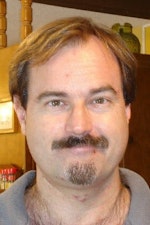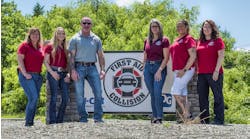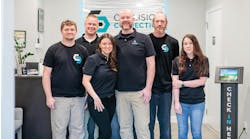Let’s face it, while the transmission is a crucial component in "transmitting" an engine’s power to the wheels, fixing one is completely unlike anything else on a vehicle. For one, outside of transferring torque, transmissions are pretty much self-contained systems. Secondly, ever since the advent of GM’s Hydra-Matic in the 1940s, automatic gearboxes have grown so complex that repairing them has become a specialty. And with automatic-equipped cars now accounting for around 95 percent of sales in the U.S., these specialists have their work cut out for them.
|
At a Glance: Total Care Transmissions & Classic Restoration |
|
National City, Calif. Location |
|
Julio Zambrano Owner |
|
1 No. of shops |
|
4 Years in business |
|
3 No. of employees |
|
2,200 Square footage of shop |
|
10 No. of vehicles per week |
|
$1500 Avg. weekly restoration ticket |
|
$230,000 Annual gross revenue |
And yet, some of them diversify. Take Total Care Transmissions of National City, Calif., a suburb of San Diego. As the name denotes, they also do general maintenance and repair, even some engine rebuilding. “Being so close to the [U.S.-Mexican] border, you’ve got to find a way to keep up with how things are changing,” says Julio Zambrano, Total Care's owner.
“I think transmission work would be a good 65 percent to 70 percent of what we do, general auto repairs about 25 percent, and the rest being restoration,” he reports. “We do have to invest in some diagnostics; (about) once a year we upgrade our scanners to be able to diagnose newer vehicles.”
Meanwhile transmission technology hasn’t stood still, either. “It’s been harder as the years go by,” notes Zambrano. “We started with the CVT, the continuously variable transmission. They’re not difficult to rebuild; we had a problem with finding parts, making them almost the same price as buying one from the dealer. It’s getting difficult in terms of keeping up, but that’s why we go to seminars every year, like ATSG and ATRA.”
Transmission fluid must be in the family’s blood: Julio’s uncle once owned three shops, which his father worked at as a technician, while Zambrano himself spent nearly a decade at another shop as well as a transmission parts supplier before also going to work for his uncle. “I was still going to (college),” he notes, “but I liked working in the shop, especially helping the customers.”
So when his uncle decided to divest himself of two of the shops in 2014, he sold one to Zambrano and his father. “My uncle basically just sold us the equipment,” he explains. “We created an entirely new (company), with a new name, new phone number. As owners it’s 50/50 between me and my dad, but I handle the office and he and my brother handle the whole auto repair part of it.”
Admittedly starting from scratch was difficult at first. “A lot of friends and family started sending people our way. That was the easy part,” Zambrano explains. “The hard part was getting more people to know about us. In the first couple of months my dad and I would sometimes hand out flyers on the weekends. I would advertise on Craig’s List, social media like Facebook, Instagram— sources I didn’t have to spend an arm and a leg on in order to get the word out.”
Now they count among their clientele three general repair shops. “We had to learn about various things, like how to build a website, how to handle social media,” Zambrano continues. “All of that was new to me, but it’s been getting easier and I’ve been learning so much; that’s why I think people started hearing about us and finding us online.”
This learning curve was complicated somewhat by the fact Zambrano was working on finishing his Bachelor’s degree in business management. “I was working full time while also going to school full time, so it was a little bit crazy for those first two or three years,” he recalls. Now he’s applying everything he learned, like improving search engine optimization (SEO) for their website so it comes up sooner online.
But things never slow down; over half a year ago Zambrano’s brother came aboard full time after his own stint at school. “So I’ve got to increase sales in order to pay for the extra time he’s going to be here,” Zambrano reports. “My goal is to increase our sales by about 20 percent in the fiscal year.”
He plans to do that by focusing more on the second half the shop’s title, Classic Restoration-- which isn’t so much getting old vehicles back to like-new condition as it is getting them on the road again. “Maybe in the future,” laughs Zambrano, “but at this point we’re not, because I don’t have a place where I can send a customer to get something painted or anything like that.
“We restore in the sense that we’ll replace or rebuild the engine,” he explains. “Anything 1975 or older are the only ones we rebuild in-house. We’ll also go through the transmission and the differential--sometimes customers want to make them limited slip. A customer might find a really good deal, like a ’64 F-100 for $1,000, but the truck has been sitting for 10-15 years. They bring it to us, we’ll get it started, and at that point the customer will decide whether he wants to keep it that way or go through the whole thing.
“Even though we work on them continuously, I feel that there’s still a market out there for more people who just want to have their old car running in good condition,” Zambrano comments. “My dad enjoys working on them, and I feel that when you enjoy what you do it doesn’t feel like work. Meanwhile my brother’s building transmissions, and he really enjoys doing that—then maybe I can have both of them happy.
“A lot of people ask if it’s really hard working with family,” Zambrano smiles, “because we each have our own ways of thinking. But I think we’ve learned to manage that by strictly treating each other as co-workers when we’re in the shop, as if we’re working for someone else. After hours we can joke around, we can do whatever we want as a family, but I think it’s really helped that we all have that kind of mindset.”





